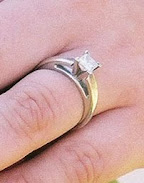"In some remote villages of Zimbabwe, it is believed that a solar eclipse occurs when a crocodile eats the sun. This celestial crocodile, they say, briefly consumes our life-giving star as a warning that he is much displeased with the behavior of man below. It is the very worst of omens."
Not that there's a shortage of bad omens in the time period that frames Godwin's memoir. Mugabe and his goons justify taking white farmers' lands through the guise of returning it to black "war vets" who fought for the nation. Many times, according to Godwin, they render highly productive land useless while inflicting senseless cruelty.
And then, there's the AIDS plague. Godwin's mother is a physician who has seen so much of the disease that she can "usually diagnose someone at the doorway of her examining room," he writes. It has meant that the country's average life expectancy has plummeted from 60 to 33.
"At 33, just as people should be in their prime, they suddenly sicken and die," Godwin writes. "And the managers of the mines and the factories and the farms have begun training three people to fill every job, because they know two will not live to work."
Against this backdrop, Godwin, a journalist for The New York Times and National Geographic magazines, among others, tells the tale of his father's slow death as his family of strong, interesting and brave people try to cope. His sister flees to London to produce an anti-Mugabe radio show and to bolster his opposition; his mother faces her own medical crisis in a land she knows first-hand is not well-suited for handling medical crises; and between assignments and his immediate family, Godwin is raising two boys in New York City.
His writing is thick without being heavy, punctuated both with telling details and humor, and reflective enough to show that Zimbabwe is far from the first nation to destroy much more than it create through a dictatorial, racist regime. And yet, he tries to explain the guilt he feels leaving that nation behind:
"I am soaring away from my fragile, breathless father with his tentative hold on life. I'm soaring away from my mother, who still lies in her hospital bed surrounded by wounded demonstrators - the trembling black women with broken limbs and puffy eyes and back striated with the angry whip marks of the dictatorship ... A nation is bleeding while I sit here cosseted with my baked trout and crispy bacon, my flute of Laurent-Perrier brut champagne, my choice of movies and my hot face towel. I am abandoning my post. Like my father before me, I am rejecting my own identity. I am committing cultural treason."
Yep. It's a book that shows us a world many of us cannot imagine through any sort of real-life experience. You should read it. It's 341 pages, every one of them good.






